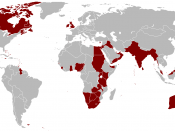World Systems Theory
The world-systems perspective is a strategy for explainingsocial change that focuses on whole intersocietal systems. The main insight is that important interaction networks (trade, alliances, conflict, etc.) weave polities and cultures together since the beginning of human social evolution, so the explaining of change needs to take intersocietal systems (world-systems) as the units that "develop."
The intellectual history of world-systems theory has roots in classical sociology, Marxian revolutionary theory, geopolitical strategizing, and theories of social evolution. But in explicit form, the world-systems perspective emerged only in the 1970s when Samir Amin, Andre Gunder Frank, and Immanuel Wallerstein began to formulate the concepts and narrate the analytic history of the modern world-system.
This entry uses an intentionally inclusive definition of "world-systems/world systems theory" (with and without the hyphen). The hyphen emphasizes the idea of the whole system, the point being that all the human interaction networks small and large, from the household to global trade, constitute the world-system.
It is not just a matter of "international relations" or global-scale institutions such as the World Bank. Rather at the present time it is all the people of the Earth and all their cultural, economic, and political institutions and the interactions and connections among them. This said, the hyphen has also come to connote a degree of loyalty to Wallerstein's approach. Other versions often drop the hyphen. Hyphen or not, the world(-)systems approach has long been far more internally differentiated than most of its critics have understood.
The world-systems perspective looks at human institutions over long periods of time and employs the spatial scale required for comprehending whole interaction systems. Single societies have always interacted in consequential ways with neighboring societies, so intersocietal interaction must be studied to understand social change. This does not mean that all the important...


